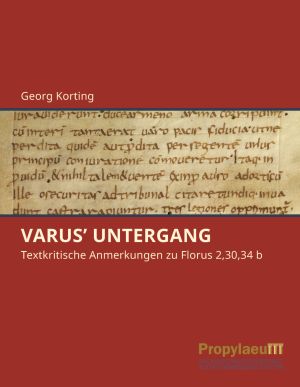Korting, Georg
VARUS’ UNTERGANG: Textkritische Anmerkungen zu Florus 2,30,34 b
This book tries to answer the question whether the assault of Arminius upon the Roman army (9 A. D.) took place in the Roman camp or en route, lasting several days, and whether Florus or Dio, Ranke or Mommsen, was right. My thesis is that the Roman historian, rhetorician and poet Florus was misunderstood in his short history of Rome, when he speaks about this incident (2,30,34 b cum ille o securitas ad tribunal citaret, undique invadunt). It is universally assumed that Varus wanted the Germans to be brought before his tribunal and that these then bursted into the camp. Meanwhile, modern historians in the majority follow Dio and renounce Florus.
However, Germans are not mentioned in Florus’ text. My main thesis is that the sentence is missing a direct object. The question that follows is whether the object behind citare may be missing in the Latin text. Therefore I examined more than 200 sentences which include citare. The result is that, under normal circumstances, it may not be missing. There are some exceptions which are being scrutinized. According to this, there is the option of conjectures. I propose one which makes it possible to put aside the contradiction between Florus and Dio. One might read: cum ille securi ita se ad tribunal citaret.
The modern standard editions of Florus’ epitome of do not have any conjecture in this passage. The investigation of several elder editions (out of a total number of 150-200) comes to the conclusion that the main thesis (about the missing object) was already implicitly advocated by Tanneguy Le Fèvre (Tanaquillus Faber) in 1672 and explicitly by his daughter Anne le Fève (Anna Fabri filia / Anne Dacier) in 1674 – each in a short foot-note –, and was only cited sporadically until 1844.







